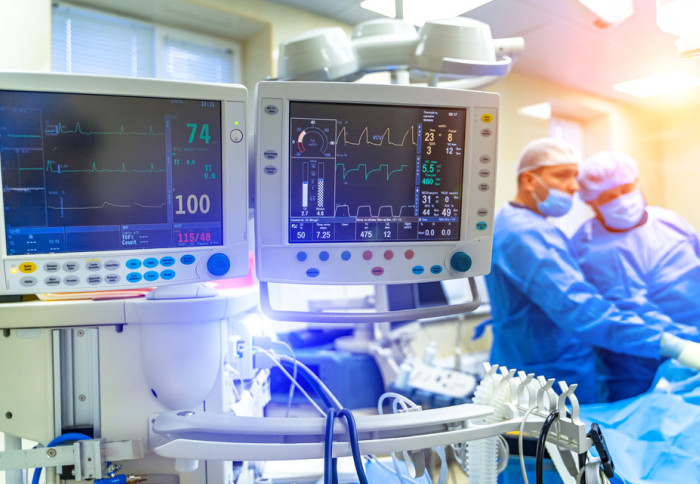Arthritis drug effective in treating sickest COVID-19 patients
by Ryan O'Hare

Vital signs
Critically ill COVID-19 patients treated with an arthritis drug are significantly more likely to have improved outcomes, a study has found.
The early findings, which are yet to be published, come from the REMAP-CAP trial, led by Imperial College London and the Intensive Care National Audit & Research Centre (ICNARC) in the UK and Utrecht University in Europe. The trial evaluates the effect of treatments on a combination of survival and length of time patients need support in an intensive care unit (ICU).
We hope our findings will offer clear guidance to clinicians for improving the outcomes of the sickest COVID-19 patients Professor Anthony Gordon Imperial College London
The results show that treatment with tocilizumab, an immunosuppressive drug used to treat rheumatoid arthritis, reached a key efficacy endpoint among critically ill patients with severe COVID-19, compared to patients who did not receive any immune modulation treatment.
Patients receiving tocilizumab were more likely to improve (measured by a combination of organ support, such as a breathing machine, in the ICU and surviving the hospital admission) compared to patients who received no immune modulator.
The relative contribution of survival and reduced length of time needing organ support in ICU has not yet been analysed. The trial does not yet know the relative benefits of tocilizumab compared to the other immune modulators. Further data are expected in the coming weeks and months.
Due to the clinical implications for patients, the researchers have released the findings before they have been peer-reviewed, but are working to analyse and publish the full results as soon as possible.
Professor Anthony Gordon, Chair in Anaesthesia and Critical Care at Imperial College London and a Consultant in Intensive Care Medicine at Imperial College Healthcare NHS Trust, said: “These early findings show that treatment with this immune modulating drug is effective for critically ill COVID-19 patients in intensive care units. When we have the results available from all participants, we hope our findings will offer clear guidance to clinicians for improving the outcomes of the sickest COVID-19 patients.”
Early findings
The latest analysis was carried out by a Statistical Analysis Committee separate from the trial investigators and reviewed by an independent Data and Safety Monitoring Board (DSMB) on 17th November. The analysis included data from the first 303 patients randomised to receive immune modulation treatments: tocilizumab, sarilumab, anakinra, interferon, or no immune modulator.
The trial data yielded an estimated odds ratio of 1.87 for a better outcome with tocilizumab compared to no immune modulation, with a high degree of statistical certainty (99.75% probability that tocilizumab is superior to no immune modulation).
In addition to these findings, the latest analysis also revealed an antiviral drug called Kaletra (lopinavir/ritonavir) to be ineffective and provided no additional benefit to critically ill COVID-19 patients, compared to those who did not receive the drug. The analysis found an estimated odds-ratio of 0.67 (worse than control) with a 99.9 per cent probability of futility (an odds ratio less than 1.20).
This is an absolutely amazing result...Specific targeting of the immune response is theoretically attractive, and now we have shown it works. Dr Lennie Derde Utrecht University
REMAP-CAP began investigating treatments for COVID-19 in March 2020, enrolling hospitalised patients with either moderate or severe (requiring ICU care) COVID-19 disease.
The study design randomises patients to multiple combinations of treatments, enabling researchers to evaluate different treatments for COVID-19, including antivirals, drugs which modulate the immune response, and therapies that modulate or support other vital aspects of the body's response to the virus.
In total, over 2,000 patients in 15 countries have been enrolled at more than 260 hospitals worldwide and randomised to multiple treatment combinations. The effects of interventions are assessed separately for moderate and severely ill patients.
The latest findings on tocilizumab and lopinavir/ritonavir add to REMAP-CAP findings from earlier this year, which found that hydrocortisone steroid treatment improved recovery among critically ill COVID-19 patients.
“This is an absolutely amazing result,” said Dr Lennie Derde, Consultant in Intensive Care Medicine at the University Medical Center in Utrecht and the Immune Modulation Domain Specific Working Group Chair. “To have a second effective therapy for critically ill patients within months of the start of the pandemic is unprecedented. Specific targeting of the immune response is theoretically attractive, and now we have shown it works.”
The study is supported in the UK by the National Institute for Health Research (NIHR) and Imperial College London & ICNARC are partners in the EU funded PREPARE consortium.
Article supporters
Article text (excluding photos or graphics) © Imperial College London.
Photos and graphics subject to third party copyright used with permission or © Imperial College London.
Reporter
Ryan O'Hare
Communications Division